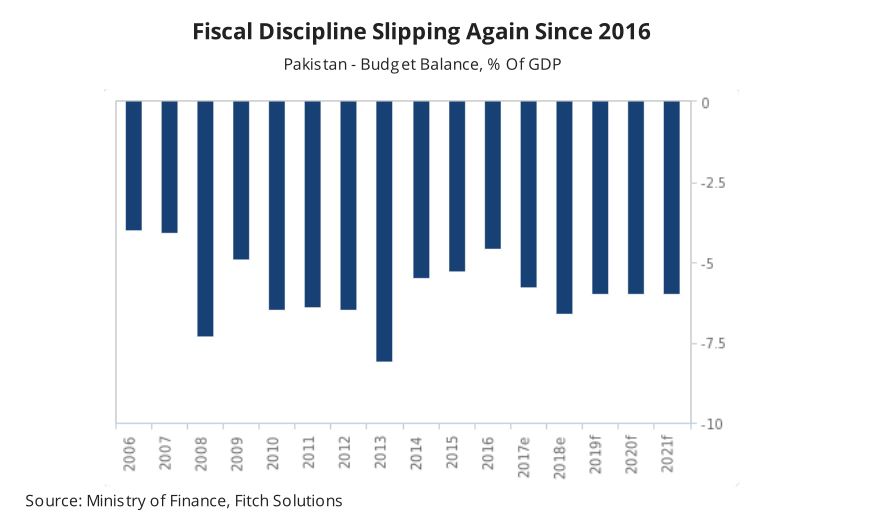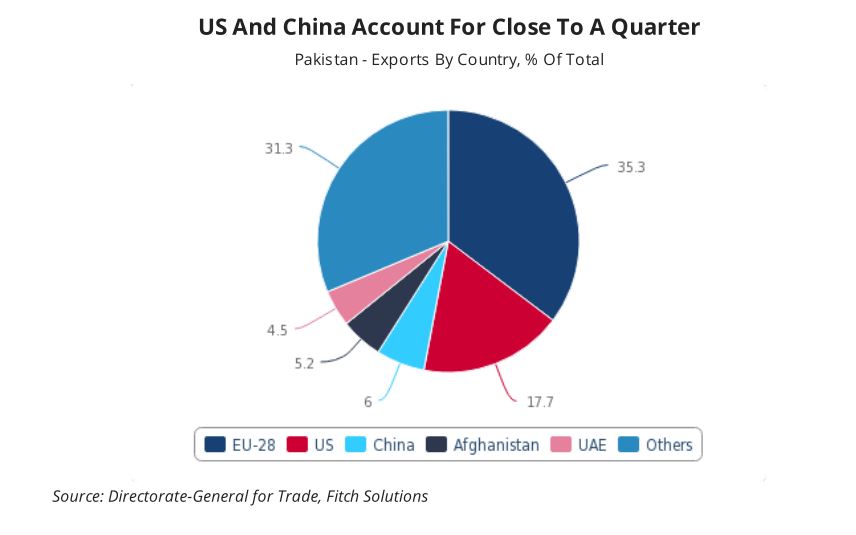
- US and China account for almost 25% of Pakistan’s exports, with the former at 1st position and latter at 2nd position respectively
LAHORE: Fitch Solutions in another report released on Monday stated Pakistan’s external account woes will continue to worsen despite the steep decline in oil prices.
The research agency said export will likely come under pressure due to a global trade slowdown and it believes a major non-oil import contraction is looking increasingly possible.
According to the report, this would negatively influence Pakistan’s economic growth over the coming quarters and it maintained the real GDP growth forecast at 4.4% for the current financial year 2018-19, despite the windfall from oil import savings.

Fitch Solution said the plunge in oil prices which commenced in October hadn’t yet been reflected in an improvement in Pakistan’s trade accounts.
The research agency highlighted that besides a meagre fall in Pakistan’s oil import bill, trade deficit clocked in at Rs371.6 billion in November, showing a slight improvement over the October figure and staying near record highs.
Similarly, foreign exchange reserves plummeted to their lowest since November 2014, touching just $9 billion, which equates to less than two months of import cover.
It added this was indicative that financial account inflows were unable to cover the trade deficit, foreshadowing an import crunch over the coming months.
The research agency wondered if the decline in oil import prices will be sufficient to balance the trade account in the absence of a sharp plunge in non-oil imports which could create severe economic disturbance.
While speaking to Profit, Arif Habib Limited’s Head of Research Samiullah Tariq said, “I think slow down in GDP growth is imminent, due to Pakistani rupee depreciation and a slowdown in development spending as the government tries to reduce fiscal deficit.”
According to the report, the previous economic crisis has been activated by a sharp decline in imports following huge external deficits.
It highlighted a prospective agreement with the International Monetary Fund (IMF) over the coming month will avert a complete balance of payment crisis.
However, the research agency cautioned the country’s external woes are not yet over.
While explaining IMF’s standard modus operandi, Fitch Solutions stated any agreement will be attached with strict targets to bolster foreign exchange reserves.
Considering the import coverage was near record-lows, the report highlighted the IMF looks set to put pressure on the central bank to greatly bolster their reserve holdings by instigating further currency weakness and/or higher interest rates.
“There will likely to be a J-curve effect whereby the country’s external accounts deteriorate initially in response to currency weakness as imports become costlier in dollar terms, while volumes of imports and exports change little at first before import volumes finally rebalance and decline to narrow the deficit,” said Fitch Solutions.
Talking about exports, the research agency highlighted that despite exports peaking near record-highs in rupee terms, they nosedived 12.8% year-on-year (YoY) in dollar terms during November.
Moreover, it projected little chance of an increase any time soon taking global trade slowdown into consideration.
The United States and China account for nearly a quarter of Pakistan’s exports and the former is the country’s main export market followed by the latter.

Respectively, the recent equity rout in the US is indicating towards an imminent slowdown in its economy and China faces continued risks from its existing trade war with the US despite a promise to open up its import market, noted Fitch Solutions.
If Pakistan’s exports decrease continues, Fitch Solutions projected total imports falling another 20-30% from here after previously falling 20% from their peak in dollar terms.
The research agency pointed out that the majority of Pakistan’s remittance inflows come from the Middle East.
It added due to the quarter four 2018 drop in oil prices indicates that manpower exports to these countries will encounter a slow down over coming months and quarters, impacting remittances.
Remittances account for approximately 7% of Pakistan’s GDP and significantly fueled private consumption and investment, concluded Fitch Solutions.






